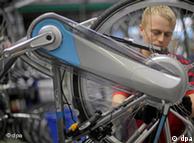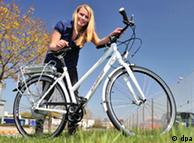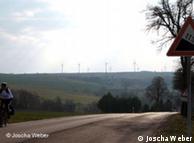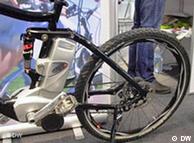TECHNOLOGY | 04.09.2010
New bikes push cyclists into electronic age
Developments in battery and motor technology are set to change the bike industry - at least if you ask any of the 1,000 bicycle manufacturers descending on the German city of Friedrichshafen to show off their latest designs at the Eurobike trade fair this weekend.
Kurt Schaer, head of Switzerland's Biketec, said his nation's mountainous landscape was behind his decision in 1993 to produce electric bicycles.
"A young engineer got sick of riding uphill to go home for lunch each day so he took a car battery and the motor from a set of windshield wipers and installed them on his bicycle," Schaer said. "It wasn't pretty, but it worked."
Years of progress
The designs at Eurobike have made considerable progress over the last 17 years and are being commercially produced in the thousands with motors that have shrunk so dramatically that they're hardly noticeable.
Demand is growing as consumers look for a little help in the saddle, according to Siegfried Neuberger, head of Germany's ZIV bicycle industry association.
"I think we can describe it as a boom," he told Deutsche Welle. "Back in 2007 the market sold 70,000 electric bikes. This year we're expecting more than 180,000."
 Battery and propulsion technology keeps improving
Battery and propulsion technology keeps improving
Last year saw the e-bikes' share of the German bicycle market climbed to 4 percent, with rising exports to the Netherlands and Scandinavia. The most popular models are so-called "pedelec" bikes. They look similar to regular bicycles, but whenever the rider pedals, a small electric motor kicks in to provide additional power to the wheels.
Advances in battery and propulsion technology mean the extra kick riders get is improving all the time, Neuberger said.
"The introduction of lithium-ion battery packs has made electric bikes more attractive because they are smaller than earlier batteries," he said. "They also carry a bigger charge, and are less prone to memory effects that reduce their effectiveness over time."
Increasing demand
Demand has grown so much that specialist companies like Biketec have been able to forego production of mechanical models and concentrate on e-bikes, a step the Swiss company took in 2005.
Nearly all established German bike brands also offer electric models. For Panther, a bicycle company with over 100 years of history in Germany, the decision to go electric was easy, according to Marketing Director Kai Wippermann.
 Different types of consumers turn to different e-bike companies
Different types of consumers turn to different e-bike companies
"Ten years ago we saw e-bikes as an opportunity to add a niche to our general portfolio," he told Deutsche Welle. "We've been quite active in the field because, first, it's lucrative, and second, the market is growing in line with the social megatrends of healthy living and mobility."
Like most German e-bike manufactures, Panther has kept its production in Germany. While Panther currently employs 120 people on e-bike production in Germany, totals for the branch are difficult to estimate as the market for e-bikes keeps growing.
Big names enter market
Some of Germany's best-known brands have taken notice of the electric bicycle market. Stuttgart-based electronics giant Bosch is one of the latest companies to join the ZIV group and will be showcasing its propulsion system at Eurobike.
While some smaller manufactures have expressed concern that international heavy hitters like Bosch could push them out of business, Biketec's Schaer said there's plenty of market share for everyone.
 Some cyclists are looking for a little electric help getting up the hills
Some cyclists are looking for a little electric help getting up the hills
"Most producers have positioned themselves carefully," he said. "Some companies only make cheap entry models. Customers who want a higher quality e-bike tend to buy from traditional bicycle brands, while those who want a real high-end product go to specialist e-bike manufacturers."
Schaer added that the combined capacity of all e-bike manufacturers is still too small to satisfy growing demand. Industry analysts expect that 20 percent of all bikes sold in Germany will be electric by 2018.
Author: Christian Siepmann (sms)
Editor: Kyle James

Comments